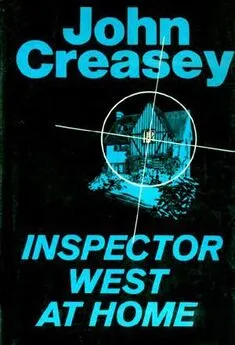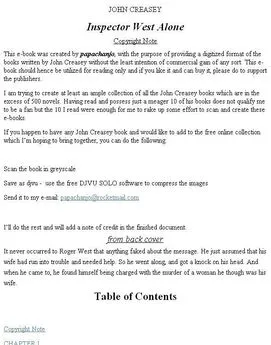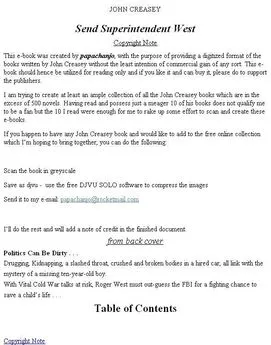John Creasey - Inspector West At Home
- Название:Inspector West At Home
- Автор:
- Жанр:
- Издательство:неизвестно
- Год:неизвестен
- ISBN:нет данных
- Рейтинг:
- Избранное:Добавить в избранное
-
Отзывы:
-
Ваша оценка:
John Creasey - Inspector West At Home краткое содержание
Inspector West At Home - читать онлайн бесплатно полную версию (весь текст целиком)
Интервал:
Закладка:
Cornish looked up from an evening paper, coloured and averted his eyes. Roger turned on his heel. He was by the door when he heard his name called and, looking over his shoulder, saw Cornish hurrying towards him, his fresh face alive with concern.
“Handsome, do you know what’s being said ?”
“And believed, apparently,” rejoined Roger.
“ Is there any truth in it ?” Cornish demanded.
“You ought to know better than to ask,” Roger said. “It’s a canard and will be recognised as such one day. Then what will all my good friends say when they come begging Superintendent West for favours?” He looked contemptuously round the room and felt suddenly unaffected by the hostility and the strength of the feeling against him. He would have felt strongly towards anyone whom he believed to have committed a cardinal crime in a policeman’s calendar. They had no time or sympathy for a renegade. He went on, sounding almost light-hearted. “You’d better be careful, Corny, or you’ll be looked upon as an accessory ! Good night!”
He went out, hearing the hum of conversation which followed. The door opened again and Cornish hurried after him.
“Roger. Roger! ” The other was distressed and Roger turned and waited. “Look here, old man,” said Cornish, “just answer me this — did you do it?”
“I did not.”
“Is there anything I can do?” asked Cornish abruptly.
Roger warmed towards him.
“If you really want to stick your neck out you can try to find out the name and address of the taxi-driver who picked me up at Sloane Square about three-quarters of an hour ago and dropped me here. I shared the cab with a man going on to Piccadilly.” That was as much as he dared ask.
“How will it help ?” Cornish demanded.
“I’m not going to let you get involved with details,” Roger said. “If you can find out just the cabby’s name and address, it could help a lot. Don’t take this too hard,” he added, cheerfully, “it won’t last for ever !”
He went on his way, grateful to Cornish, and was smiling to himself when he turned the corner. Sir Guy Chatworth, a large, burly man wearing a long mackintosh which rustled about his legs, and a wide-brimmed hat — nearly but not quite a Stetson, was shutting his office door. His large, round features were set in a scowl, by no means unusual. His natural colour was brick red.
“Good evening, sir,” said Roger.
Chatworth raised his massive head and stared at him.
He put the key in his pocket, and demanded heavily:
“What do you imagine you are doing here?”
“I’ve come for two things,” Roger said. “First, an interview with you, sir, and second, to apply for a release from duty for four weeks.”
“Oh,” said Chatworth, ominously. “You want release from duty, do you? Well, you can’t have it. You are suspended from duty.”
“That’s news to me,” said Roger. “I’ve had no notification, sir.”
Chatworth thrust his chin forward, narrowed his eyes, often round and deceptively wondering and innocent. “It isn’t dated until tomorrow morning. You’re being clever, are you, West? If you think you can apply for release and escape the stigma of suspension, you’re wrong.”
“I’ve been wrong about so many things that nothing will surprise me.”
“What do you mean ?” snapped Chatworth.
“I had always been under the impression that any man of yours would receive scrupulously fair treatment,” Roger said. “It was a nasty shock to find I was wrong about that.”
“You had your opportunity to discuss this with me,” Chatworth said. He stood by the door, feet planted wide apart, his mackintosh draped about him like a night-shirt which was too large. He pushed back the big hat and revealed his high forehead and the front of his bald head. At the sides was a thick fringe of close curls, blond turning grey.
“I had no such thing,” said Roger.
“You appear to be forgetting yourself,” Chatworth said coldly. “You were requested by Superintendent Abbott to come here to see me, and you refused. You were also insolent to a superior officer.”
“In the same circumstances any man should be “insolent” to an officer who invaded the privacy of his home, adopted an arrogant and overbearing manner to his wife and tried to take advantage of seniority,” Roger said clearly. “Superintendent Abbott appears to have misled you, sir. He did not say that you wished to see me. He asked me to go with him for questioning. As I knew nothing of the circumstances and he would not give me any information, I refused.”
Chatworth frowned, then dug his hand into his pocket. He took out the key, unlocked the door and pushed it open, striding into the room ahead of Roger, who followed without an invitation.
“Close the door.” Chatworth walked to his flat-topped desk. Everything in the room was modern, most of the furniture was of tubular steel, filing cabinets and desk were of polished metal which looked like glass. There was concealed wall- lighting and a single desk-lamp, all of which were controlled by a main switch.
Chatworth unbuttoned his mackintosh but did not take it off. He placed his hat on the desk in front of him and looked up at Roger, who was standing a yard from the desk without expression. Chatworth pushed his lips forward in deliberation, then said :
“I am grievously disappointed in you, West.”
“And I in you, sir.”
“Are you out of your senses ?”
“It is a very grave matter for me, sir,” Roger said. “I don’t think it has been properly handled. If a sergeant dealt with a parallel case in the same way I should have his stripes.”
He had burned his boats, but Chatworth would think no worse of him and it might enable him to force a hearing. He had won a minor triumph by getting into the room at all. He stood at ease, with one hand in his mackintosh pocket, and thought of the letter from ‘K’.
Then Chatworth nearly floored him.
“Who broke into your house while Abbott was there?”
“I don’t understand you, sir,” Roger said.
“Yes you do. While Abbott was in your house Lessing arrived and drummed on the piano while a man broke in through a first floor window, and removed the evidence which Abbott went to find. Don’t lie to me, West. You think that was clever, but it was a mistake.”
“To my knowledge there was never any evidence in my house which would convict me of accepting bribes. I have never accepted a bribe in my life. I don’t know where you got your information, nor how long I have been suspect, but
I do know that I think the methods adopted to trap me are disgraceful. You appear to have prejudged me, you’ve denied me the right to enter a defence. My best course, I think, is to refer the matter to the Home Secretary.”
“Are you trying to frighten me ?”
“I am giving you notice of my intention,” said Roger. “That’s more than anyone did for me.” He paused but Chatworth simply sat back and stared at him; the desk-lamp shone on his polished cranium.
Looking at a man who had often been friendly and with whom he had worked for several years, one whom he had almost regarded with hero-worship, Roger felt a quickening tension. Until then, he had thought it just possible that Chatworth had deliberately planned to smear him so that he could work surreptitiously. The last hope should have died when he had found ‘K’s’ note, which was proof of evil intent.
Now he saw the situation for what it was — absurd but highly dangerous. Chatworth was not an ogre, but a reasonable human beneath his gruff manner. Roger stepped forward and planted both hands on the desk.
“I know that you must have strong reasons for what you’ve done,” he said. “You might at least give me the chance to answer the allegations. My record at the Yard should entitle me to that. The case must be more serious even than the seriousness of accepting bribes, or you wouldn’t have been so arbitrary. And Abbott’s visit doesn’t make sense.” He saw Chatworth going even redder. “If I were guilty, I wouldn’t be fool enough to keep evidence in my house.”
“That’s enough, West,” said Chatworth in a more reasonable tone. “Sit down.” That was a ray of hope. So was the way Chatworth pushed a box of cigarettes towards him. He lit up, and Chatworth bit the end off a cheroot. “For the first time I’m beginning to think I might be wrong,” Chatworth went on. “Why do you want four weeks’ leave?”
“To investigate this affair for myself.”
Chatworth unlocked a drawer in his desk and drew out a manilla folder. Roger leaned back and drew on his cigarette. The office was quiet except for the rustling of papers, until Chatworth glanced up and said sharply : “How do you account for seven payments of two hundred and fifty pounds paid into your account at the Mid-Union Bank, Westminster, during the last three months? Cash payments, always in one-pound notes. Where did you get the money?”
Roger was stupefied. “It’s not true!” he protested.
“Now, come. I have seen the account, talked to the cashier and the manager. Your wife made the payments.”
“Nonsense!” said Roger.
“Are you telling me that you don’t know what money there is in your account?”
“I use the Mid-Union bank only for occasional transactions,” Roger said. “It’s a supplementary to my main account at Barclavs, Chelsea. I’ve sent no credit to Mid- Union for at least six months. Nor has my wife.”
Chatworth said :
“Look at that.”
He handed a bank paying-in book across the desk. It was a small one, with half the pages torn out, leaving only the counterfoils. Roger saw that the first entries were in his handwriting — the book was undoubtedly his. He glanced through it, seeing a payment of fifty pounds which he had made in the September of the previous year. From then on — beginning in the middle of January — there were the payments which Chatworth had mentioned. The official stamp of the Mid-Union Bank with initials scrawled across it was there and the name at the top of each counterfoil was his.
Roger turned the counterfoils. The first shock over, he was able to study the writing and he noticed the regular lettering, it was almost copperplate writing, such as the man who had signed himself ‘ K ’ might have written.
“Well ?” demanded Chatworth.
“And my wife is supposed to have paid these in?” said Roger. “No, sir, it didn’t happen that way. The money has been paid in, all right. They’ve taken a lot of trouble to frame me, haven’t they?” He smiled, looked almost carefree. “I suppose someone representing herself to be my wife made the calls?”
“The description of the woman in every case is identifiable with your wife,” Chatworth declared.
“The description of any attractive, average build dark- haired woman with a flair for dressing well would do for that.”
“You seem remarkably pleased with yourself,” said Chatworth, sarcastically.
“I’m greatly relieved, sir! This is obviously one of your main items of evidence. My wife didn’t visit the bank and the bank’s cashiers will say so when they see her. You’ll arrange for several cashiers to see her, won’t you?”
“Yes,” said Chatworth. He leaned back and closed one eye. His pendulous jowl pressed against his collar, only half of which was visible. “You’re remarkably smug,” he remarked. “You could have sent another young woman.”
Roger laughed. “Aren’t you letting yourself be carried away, sir?”
Читать дальшеИнтервал:
Закладка:










